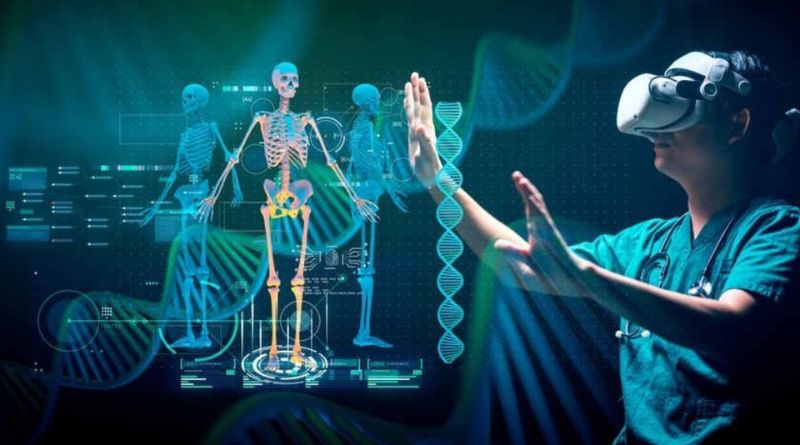Artificial Intelligence (AI) is rapidly transforming various sectors, and healthcare is no exception. The integration of AI into healthcare systems promises to revolutionize patient care, streamline operations, and enhance overall health outcomes. This article explores how AI is reshaping the future of healthcare, the technologies driving these changes, and their potential impacts on the industry.
Table of Contents
1. How AI is Transforming Healthcare
1.1. Enhanced Diagnostic Accuracy
AI-powered diagnostic tools leverage machine learning algorithms to analyze medical images and data with remarkable precision. For instance:
- Medical Imaging: AI systems, such as those used in radiology, can detect anomalies in X-rays, MRIs, and CT scans that might be missed by the human eye. These systems are trained on vast datasets to identify patterns and provide more accurate diagnoses.
- Pathology: AI algorithms assist pathologists in analyzing tissue samples, helping to identify diseases like cancer at an earlier stage and with higher accuracy.
1.2. Personalized Medicine
AI enables the development of personalized treatment plans tailored to individual patient profiles. By analyzing genetic information, lifestyle data, and medical history, AI can:
- Predict Disease Risk: AI models can predict an individual’s risk of developing certain conditions based on their genetic makeup and lifestyle choices.
- Customize Treatments: AI helps in crafting personalized treatment regimens, ensuring that therapies are more effective and have fewer side effects.
1.3. Drug Discovery and Development
The drug development process is lengthy and expensive. AI accelerates this process by:
- Identifying Drug Candidates: AI algorithms can analyze biological data to identify potential drug candidates more quickly than traditional methods.
- Predicting Drug Interactions: AI can predict how different drugs interact with each other and with the human body, reducing the risk of adverse effects.
1.4. Virtual Health Assistants
AI-powered virtual health assistants and chatbots offer several benefits:
- 24/7 Support: These systems provide round-the-clock assistance to patients, answering questions, scheduling appointments, and offering basic health advice.
- Symptom Checker: Virtual assistants can analyze symptoms and recommend whether patients should seek medical attention, helping to triage and manage patient flow.
1.5. Operational Efficiency
AI improves healthcare operations through:
- Administrative Automation: AI streamlines administrative tasks such as scheduling, billing, and patient records management, reducing administrative burdens on healthcare professionals.
- Predictive Analytics: AI helps hospitals and clinics forecast patient volumes, manage resources more effectively, and improve overall operational efficiency.
2. Challenges and Considerations
Despite its potential, integrating AI into healthcare comes with challenges:
- Data Privacy: Ensuring the privacy and security of patient data is critical. AI systems require access to vast amounts of personal health information, raising concerns about data breaches and misuse.
- Bias and Fairness: AI algorithms can inadvertently perpetuate biases present in training data. It is essential to develop and train AI systems in a way that minimizes biases and ensures equitable care.
- Regulation and Standards: Establishing clear regulatory standards for AI in healthcare is crucial to ensure safety, efficacy, and ethical use of technology.
- Integration with Existing Systems: Implementing AI solutions in healthcare requires seamless integration with existing electronic health records (EHR) and other health IT systems.
3. The Future Outlook
As AI continues to evolve, its impact on healthcare is expected to grow:
- Advancements in AI Research: Ongoing research will likely lead to more sophisticated AI systems capable of tackling complex healthcare challenges.
- Greater Personalization: The shift towards precision medicine will become more pronounced, with AI playing a central role in tailoring treatments to individual needs.
- Increased Collaboration: Collaboration between AI developers, healthcare providers, and regulatory bodies will be essential in addressing challenges and optimizing the use of AI in healthcare.
FAQs
1. What are the main benefits of AI in healthcare?
AI offers several benefits, including enhanced diagnostic accuracy, personalized medicine, accelerated drug discovery, improved operational efficiency, and round-the-clock virtual health support.
2. How does AI improve diagnostic accuracy?
AI improves diagnostic accuracy by analyzing medical images and data with high precision, detecting patterns that may be missed by human practitioners. This leads to earlier and more accurate diagnoses of conditions.
3. What are some challenges associated with AI in healthcare?
Challenges include ensuring data privacy, addressing biases in AI algorithms, establishing clear regulatory standards, and integrating AI solutions with existing healthcare systems.
4. How can AI contribute to personalized medicine?
AI contributes to personalized medicine by analyzing individual genetic information, medical history, and lifestyle data to tailor treatment plans, predict disease risk, and optimize therapeutic outcomes.
5. What role do virtual health assistants play in healthcare?
Virtual health assistants provide 24/7 support, answer patient queries, schedule appointments, and offer symptom-checking services, thereby improving patient access to healthcare and streamlining administrative tasks.
6. What future advancements can we expect from AI in healthcare?
Future advancements may include more sophisticated AI systems for complex health challenges, greater personalization of medical treatments, and enhanced collaboration between AI developers and healthcare providers.
AI is poised to revolutionize healthcare by enhancing diagnostic accuracy, personalizing treatments, and improving operational efficiency. While there are challenges to address, the continued development and integration of AI technologies promise significant benefits for patients and healthcare providers alike. Embracing these advancements with careful consideration and planning will be crucial in shaping the future of healthcare.



